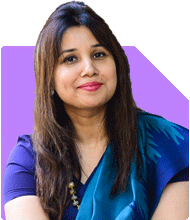Feeling disconnected from myself? Coping with frequent mood swings.
Aruna Agarwal | Answer |Ask -Follow
Child and Parenting Counsellor - Answered on Jul 13, 2024
She has a master’s degree in psychology with a specialisation in behaviour analysis. She focuses on children between the ages of 2-10 years who face challenges related to behaviour, language development or attention issues and providing them with the right life skills.
Agarwal is the owner of Kidzee, a pre-primary school, and Mount Litera Zee School that caters to primary students.... more

I don't fee normal, I don't live my life to the fullest; actually I feel like I am just living half of my life i.e. I am not the same person on all days I mood swings repeatedly. One day i am someone & another day a completely other person& it happens regularly I can't stop it.
You may like to see similar questions and answers below
Anu Krishna |1746 Answers |Ask -Follow
Relationships Expert, Mind Coach - Answered on Jun 10, 2023
Dr Ashish Sehgal | Answer |Ask -Follow
Relationships Expert, Mind Coach - Answered on Feb 20, 2024
Anu Krishna |1746 Answers |Ask -Follow
Relationships Expert, Mind Coach - Answered on Nov 12, 2025
Nitin Narkhede |113 Answers |Ask -Follow
MF, PF Expert - Answered on Dec 15, 2025
Nitin Narkhede |113 Answers |Ask -Follow
MF, PF Expert - Answered on Dec 15, 2025
Ramalingam Kalirajan |10893 Answers |Ask -Follow
Mutual Funds, Financial Planning Expert - Answered on Dec 15, 2025
Ramalingam Kalirajan |10893 Answers |Ask -Follow
Mutual Funds, Financial Planning Expert - Answered on Dec 15, 2025
Radheshyam Zanwar |6746 Answers |Ask -Follow
MHT-CET, IIT-JEE, NEET-UG Expert - Answered on Dec 15, 2025
Ramalingam Kalirajan |10893 Answers |Ask -Follow
Mutual Funds, Financial Planning Expert - Answered on Dec 15, 2025
Ramalingam Kalirajan |10893 Answers |Ask -Follow
Mutual Funds, Financial Planning Expert - Answered on Dec 15, 2025
Ramalingam Kalirajan |10893 Answers |Ask -Follow
Mutual Funds, Financial Planning Expert - Answered on Dec 15, 2025
Samraat Jadhav |2508 Answers |Ask -Follow
Stock Market Expert - Answered on Dec 15, 2025
Ramalingam Kalirajan |10893 Answers |Ask -Follow
Mutual Funds, Financial Planning Expert - Answered on Dec 15, 2025


























